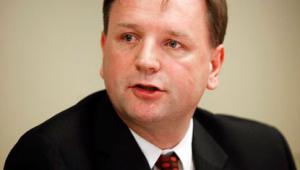By Richard Johnstone in Bournemouth | 9 July 2014
NHS chief executive Simon Stevens today set out plans for the health service and councils to work together to give people with high care needs greater control over their treatment as part of a ‘big offer’ on integration.
In his speech to the Local Government Association’s conference this afternoon, Stevens said the ‘radical new option’ for individuals to combine and direct health and social care support could be in place from next April. This is the same time that the £3.8bn Better Care Fund integration of health of social care should be introduced, following a revision of the plans this week.
The new Integrated Personal Commissioning programme would be made available to four groups, Stevens said. These were: people with long-term conditions, including frail elderly people; children with complex needs; people with learning disabilities; and people with severe and enduring mental health problems.
The scheme will build upon the constructive joint work now under way on the Better Care Fund, he said, while also extending the use of personal budgets in continuing care and the early experience of 14 integrated care pioneers.
People need ‘real power’ to shape their own care, Stevens said.
‘If Beveridge was alive today he’d clock the fact that – given half a chance – people themselves can be the best “integrators” of the health and social care they are offered.
‘We need to stop treating people as a collection of health problems or treatments. We need to treat to them as individuals whose needs and preferences should be seen in the round and whose choices shape services, not the other way round.
‘That’s the big offer the NHS increasingly has to make to our fellow citizens, to local authorities, and to voluntary organisations.’
Benefits of integration that have been demonstrated in existing pilot schemes included patients being able to focus care on conditions when they flared up, and allowing people recuperate from brain injuries at home rather than hospital.
Under the IPC programme, a combined NHS and social care funding deal, called an endowment, will be created based on each individual’s annual care needs. This will bring together money contributed from local authorities and NHS commissioners – both clinical commissioning groups and NHS England.
Individuals will then be able to decide how much control to assume over how services are commissioned and arranged on their behalf. Voluntary organisations would be commissioned locally to support personal care planning, as well as providing advocacy and service ‘brokerage’ for these in the programme, Stevens added.
NHS England will now work with partners in local government, CCGs, patient groups and the voluntary sector to develop a prospectus for the reform, which will be published at the end of July. This will formally invite local expressions of interest for participation in the programme.





















